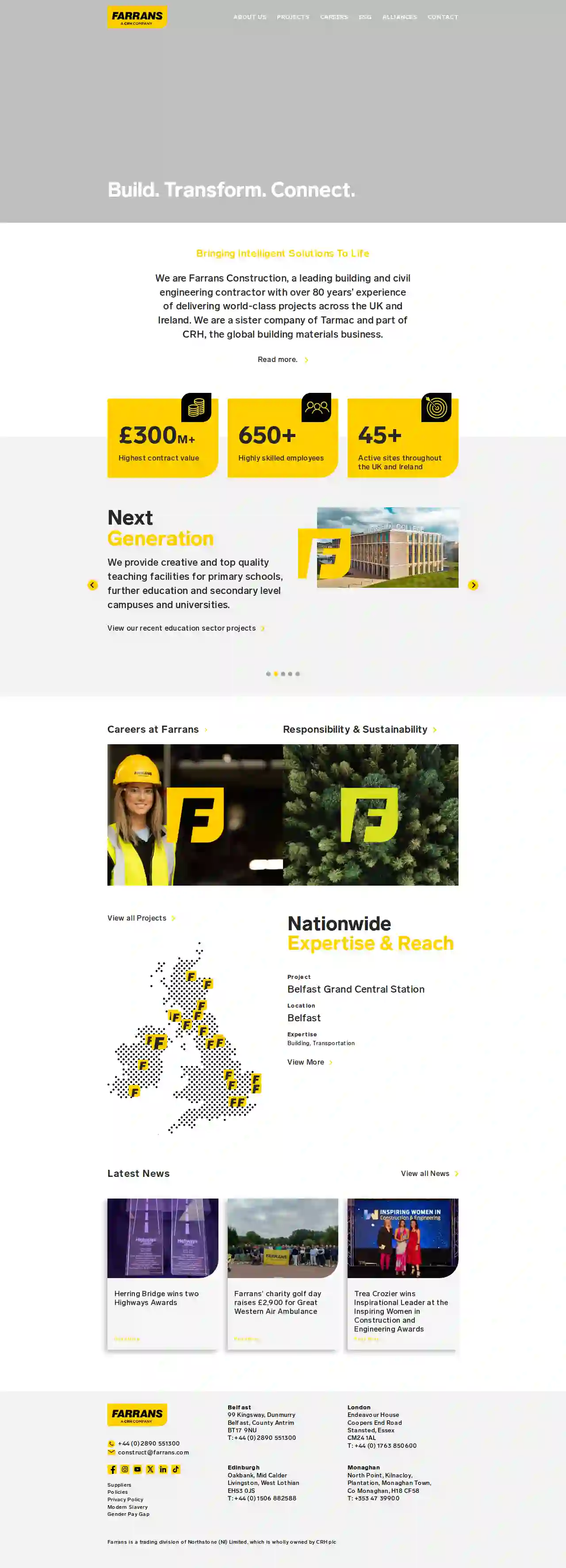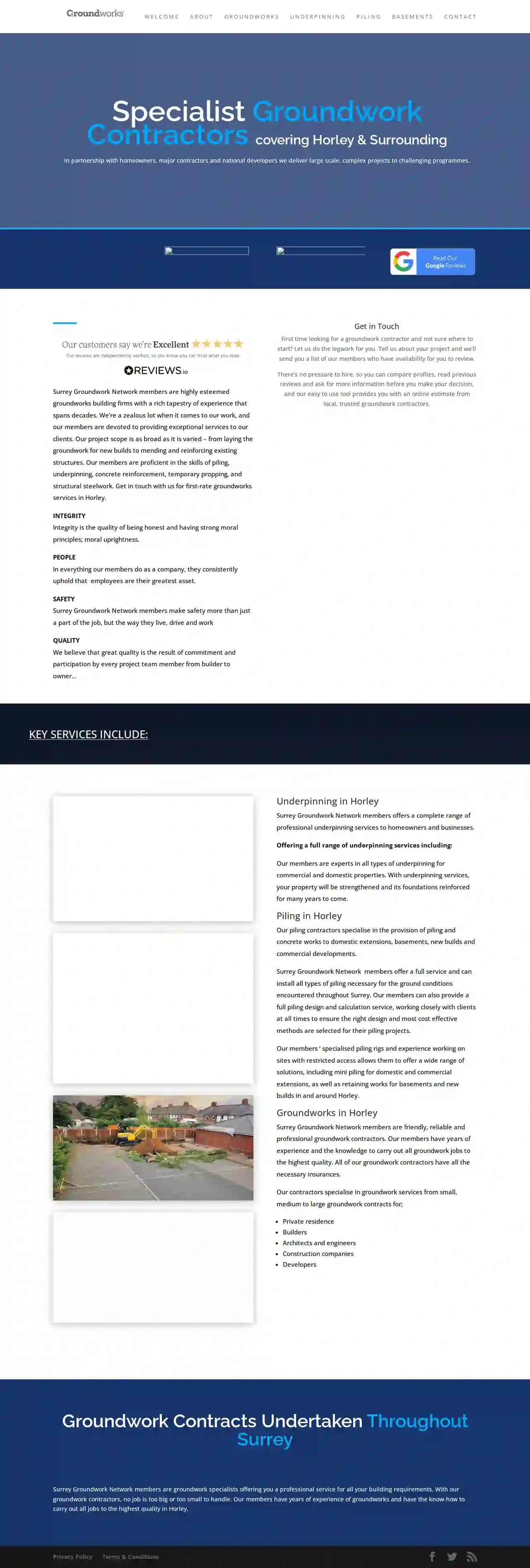Excavation Contractors Crigglestone
Find Excavating Contractors in Crigglestone
Receive up to 3 Land Excavation quotes for your project today! Compare profiles, reviews, accreditations, portfolio, etc... and choose the best offer.

Farrans Construction
4.34 reviewsLivingston, West Lothian, Oakbank, Mid Calder, EH53 0JS, GBBuild. Transform. Connect. Bringing Intelligent Solutions To Life We are Farrans Construction, a leading building and civil engineering contractor with over 80 years’ experience of delivering world-class projects across the UK and Ireland. We are a sister company of Tarmac and part of CRH, the global building materials business.
- Services
- Why Us?
- Gallery
Get Quote
Dual Piling Ltd
51 reviewsThe Forge, Ockham Lane, The Forge Ockham Lane Cobham Surrey, Cobham, KT11 1LU, GBBuild on our firm foundations Dual Piling Ltd is well-trusted and known for delivering high quality groundworks and piling projects. Basements We are experienced at building basements and can take your project from your initial idea to completion. Alternatively, we can provide just a structural shell or a structural waterproof shell ready for fit out. We utilise a number of different methods to form the basement depending on the ground conditions, proximity to other buildings and whether there is an existing building on top. Groundworks Dual Piling provide a complete range of groundwork solutions from site investigations and design to installation and testing. We specialise in difficult sites where there is difficult access, low headroom, restricted working areas or difficult ground conditions and we can use electrically powered rigs for environmentally sensitive areas. Piling Dual Foundations provides a complete range of groundwork solutions from site investigations and design to installation and testing. We specialise in difficult sites where there is difficult access, low headroom, restricted working areas or difficult ground conditions and we can use electrically powered rigs for environmentally sensitive areas. Large Projects Big projects for us are full residential or commercial building foundations, basements, large scale piling operations and swimming pools. These are mostly commissioned by building contractors and project managers. Smaller Projects Smaller projects for us are residential home extension foundations, concrete slabs for outbuildings/garages, underpinning and retaining walls. About Our Company Dual Piling provides expert piling services in the South West, London and Home Counties for domestic and commercial construction projects. We are one of the region’s leading piling and groundworks companies – offering a one stop shop for pile and foundations design, drainage and floor construction to supply the full foundation package. As a family business established for over thirty years, we are proud of our reputation for reliability and expertise. Our experience extends to cover many different types of foundation solutions, including working on restricted access sites. As a piling and groundworks contractor we offer a wide range of foundation services to both domestic and commercial customers. For piling, mini piling, continuous piled walls, retaining walls, ground beams and slabs, block and beam floors, drainage, underpinning and associated works. What our customers say SBPM Constuction Ltd Horsley, Surrey I have used Dual Piling for many projects over the years ranging from small extensions to house foundations packages and I am never disappointed with the results I get. The whole Dual Piling crew that Tony has on board are excellent at their trade and will always go the extra mile. Whichever Dual Piling crew are on my sites, they are always hardworking, approachable and always leave me with a fantastic clean job. Peter B. - House Developer, Coldharbour, Dorking, Surrey I reached out to Dual Piling for a house foundation plan which required piling and ground beams for 3 houses I was building for a client in Guildford. Dual Piling were fantastic to deal with and left me with an impeccable job to which my bricklayers said it was the best surface on which they had ever laid bricks! Dual Piling are a friendly family run company who were very approachable and while I was on site with the client, would come over and answer any questions we had about the project and would talk the client through the next stages, which I felt was a great personal touch leaving the client very happy and assured. Dual Piling left me an outstanding house foundation from the piling stage to the ground beams and garage reinforced concrete slabs and I will be using them again on my next project without hesitation. Neil M. House Owner Bookham, Surrey Dual Piling did the piling and ground beams for my small back extension for my new kitchen diner. Dual Piling were great from start to finish, from the piling and ground beam design to the finished product leaving the site spotless. Myself and my incoming builder were extremely happy with the finished project. This set us up perfectly to carry on with the next stage.
- Services
- Why Us?
- Our Team
- Testimonials
- Gallery
Get Quote
Fastsource Ltd
3.617 reviewsThe Old Coal Yard, Calder Vale Road, The Old Coal YardCalder Vale RoadWakefieldWest Yorkshire, Wakefield, WF1 5PH, GBAbout Fastsource Keith and Jean Blasket started Fastsource back in 1990, initially focusing on muck away services to the construction industry. As their knowledge and experience has grown, so too has the size of their team and the scope of the services they provide to their valued clients. Fastsource is now one of the leading enabling works contractors in Yorkshire, with 25+ staff and a large fleet of demolition, remediation and excavation machinery and equipment, and holds the following qualifications, accreditations and professional memberships: The Contractors Health and Safety Assessment Scheme (CHAS) Safety Management Advisory Services (SMAS) The Road Haulage Association (RHA) SMSTS WAMITAB NVQ Level 3 & 6 CPCS CCDO First Aid YHAUC Materials Recognition As a family run business, when you choose Fastsource as your enabling works contractor, you’re guaranteed a friendly and professional service at all times. Read More About Us
- Services
- Why Us?
- Testimonials
- Gallery
Get Quote
DC Groundworks & Landscapes
Ossett, GBSpecialist Groundwork Contractors covering Horley & Surrounding In partnership with homeowners, major contractors and national developers we deliver large scale, complex projects to challenging programmes. Surrey Groundwork Network members are highly esteemed groundworks building firms with a rich tapestry of experience that spans decades. We’re a zealous lot when it comes to our work, and our members are devoted to providing exceptional services to our clients. Our project scope is as broad as it is varied – from laying the groundwork for new builds to mending and reinforcing existing structures. Our members are proficient in the skills of piling, underpinning, concrete reinforcement, temporary propping, and structural steelwork. Get in touch with us for first-rate groundworks services in Horley. Our Values INTEGRITY Integrity is the quality of being honest and having strong moral principles; moral uprightness. PEOPLE In everything our members do as a company, they consistently uphold that employees are their greatest asset. SAFETY Surrey Groundwork Network members make safety more than just a part of the job, but the way they live, drive and work QUALITY We believe that great quality is the result of commitment and participation by every project team member from builder to owner… Get in Touch First time looking for a groundwork contractor and not sure where to start? Let us do the legwork for you. Tell us about your project and we’ll send you a list of our members who have availability for you to review. There’s no pressure to hire, so you can compare profiles, read previous reviews and ask for more information before you make your decision, and our easy to use tool provides you with an online estimate from local, trusted groundwork contractors.
- Services
- Why Us?
- Gallery
Get Quote
Lexen Contractors
51 reviewsOssett, GB- Services
- Why Us?
Get Quote- Oa
Oakbridge Group
4.719 reviewsOssett, GB- Services
- Why Us?
Get Quote - Mo
Montrose Landscape Gardening
4.853 reviewsOssett, GB- Services
- Why Us?
Get Quote - J
J E D Groundworks Ltd
Ossett, GB- Services
- Why Us?
Get Quote - Ge
Geoff Woodhams
51 reviewsOssett, GB- Services
- Why Us?
Get Quote - Vi
Viking Groundworks
51 reviewsOssett, GB- Services
- Why Us?
Get Quote
Over 13,059+ Excavation Contractors in our network
Our excavation pros operate in Crigglestone & surroundings!
ExcavationHQ has curated and vetted Top Excavation Contractors arround Crigglestone. Find the most trustworthy business today.
Frequently Asked Questions About Excavation Contractors
- Basement Size: The larger the basement, the more excavation is required, increasing the cost.
- Soil Type: Excavating rocky or dense clay soil is generally more expensive than loose soil.
- Accessibility: Difficult-to-access sites might require specialized equipment or more labor, driving up costs.
- Foundation Type: The chosen foundation type (full basement, crawl space, slab) affects excavation needs.
- Underpinning: If underpinning (strengthening existing foundations) is necessary, it significantly increases costs.
- Disposal Fees: Hauling excavated soil to disposal sites adds to the overall expense.
- Spring and Fall: Often considered favorable due to moderate temperatures and drier soil conditions.
- Summer: Can be suitable, but hot weather can make working conditions challenging and might require additional measures (shade, hydration) for workers.
- Winter: Excavation in winter can be more difficult due to frozen ground, snow, and potential delays caused by inclement weather. It might also require specialized equipment or techniques.
- New Construction: Laying foundations, basements, or underground utilities for new buildings.
- Home Additions: Creating space for new rooms, basements, or extensions.
- Landscaping: Leveling ground, creating slopes, installing retaining walls, or digging for ponds or pools.
- Drainage Improvement: Installing French drains, drainage ditches, or swales to manage water runoff.
- Utility Installation or Repair: Laying new water, sewer, gas, or electrical lines, or repairing existing ones.
- Demolition: Clearing debris and preparing the site after demolishing a structure.
- Sloped Property: Your property has a significant slope, making it prone to soil erosion or landslides.
- Creating Usable Space: You want to level off a sloped area to create a flat surface for patios, gardens, or other outdoor spaces.
- Preventing Damage: Erosion is threatening existing structures, driveways, or walkways.
- Landscaping Features: You're incorporating tiered gardens, raised beds, or other landscaping elements requiring soil retention.
How much does it cost to excavate a basement?
What is the best time of year for excavation?
How do I know if I need excavation for my project?
How do I know if I need a retaining wall?
How much does it cost to excavate a basement?
- Basement Size: The larger the basement, the more excavation is required, increasing the cost.
- Soil Type: Excavating rocky or dense clay soil is generally more expensive than loose soil.
- Accessibility: Difficult-to-access sites might require specialized equipment or more labor, driving up costs.
- Foundation Type: The chosen foundation type (full basement, crawl space, slab) affects excavation needs.
- Underpinning: If underpinning (strengthening existing foundations) is necessary, it significantly increases costs.
- Disposal Fees: Hauling excavated soil to disposal sites adds to the overall expense.
What is the best time of year for excavation?
- Spring and Fall: Often considered favorable due to moderate temperatures and drier soil conditions.
- Summer: Can be suitable, but hot weather can make working conditions challenging and might require additional measures (shade, hydration) for workers.
- Winter: Excavation in winter can be more difficult due to frozen ground, snow, and potential delays caused by inclement weather. It might also require specialized equipment or techniques.
How do I know if I need excavation for my project?
- New Construction: Laying foundations, basements, or underground utilities for new buildings.
- Home Additions: Creating space for new rooms, basements, or extensions.
- Landscaping: Leveling ground, creating slopes, installing retaining walls, or digging for ponds or pools.
- Drainage Improvement: Installing French drains, drainage ditches, or swales to manage water runoff.
- Utility Installation or Repair: Laying new water, sewer, gas, or electrical lines, or repairing existing ones.
- Demolition: Clearing debris and preparing the site after demolishing a structure.
How do I know if I need a retaining wall?
- Sloped Property: Your property has a significant slope, making it prone to soil erosion or landslides.
- Creating Usable Space: You want to level off a sloped area to create a flat surface for patios, gardens, or other outdoor spaces.
- Preventing Damage: Erosion is threatening existing structures, driveways, or walkways.
- Landscaping Features: You're incorporating tiered gardens, raised beds, or other landscaping elements requiring soil retention.